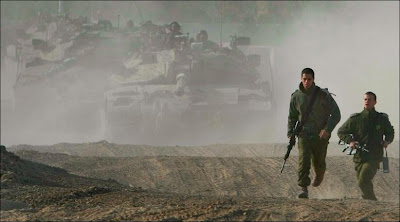 SEAN - Led by Joshua, the ancient Israeli army leveled and set fire to the Canaanite cities of Jericho and Ai in the 1400's BC, not leaving any survivors. PIC: modern Israeli soldiers, apparently training for urban combat situations. Photo courtesy of Google Images.
SEAN - Led by Joshua, the ancient Israeli army leveled and set fire to the Canaanite cities of Jericho and Ai in the 1400's BC, not leaving any survivors. PIC: modern Israeli soldiers, apparently training for urban combat situations. Photo courtesy of Google Images.-------------------------Based on ESV.com's Chronological Bible In a Year schedule. If anyone would like to join in, this blog's comments sections would be a good forum for sharing what you find.-------------------------
1. As Joshua son of Nun led Israeli soldiers into the land of Canaan, they were confronted with the commander of Yahweh's army (Josh. 5.13-6.2); this means that while Joshua and his men were climbing over rubble and slaughtering Canaanites, God was the real worker. His work was clearest in the crumbling of Jericho's massive walls (Josh. 6.20-21), and in giving Joshua the plan to that was used to ambush the people of Ai (Josh 8.1,18-19). God determined whether Israel conquered Canaan, just like He determines every other thing. Can a city fall, unless God does it? No. God is in control. He determines what succeeds and what fails - He makes it happen.
Get Right With Your Maker
2. If God controls the outcome of everything, we had better get right with Him before we do anything else. That's why Israel circumcised themselves before commencing military operations against Jericho (5.2-3), and observed the Passover (5.10). After that, Israel had God's blessing and stormed the city and burnt it to the ground. Israel couldn't conquer Ai either, until they had dealt with the sin of Achan (7.1-26) and made things right with God. Maybe that is why the Bible talks so much about praying in the morning - we make things right with God before we start our day, because He decides whether our day is productive or not. I've got to work harder on that, then.
God Determines, But We Still Act
3. God made the walls fall down from Jericho, and gave the strategic plan to ambush Ai. He also worked during the battle in unseen ways, making the arms of Canaanite soldiers feel heavy and tired, while giving Israel quick reflexes and strength. But Israel still fought the battle. So that should be a lesson for us - divine sovereignty and human responsibility. God is in total control (sovereignty), but we still have to do our part (responsibility). We can not just sit back, grab a bag of doritos, and sink into the couch while pleading through crumb-filled lips, "God, please (munch) fix my marriage (crunch)." The God who made you and me and created the universe is in complete control... but you and I still have to work. His total control does not equal our total lazinesss.
Summing Up the Post
- God is in control of everything. Nothing succeeds or fails apart from Him.
- Therefore, we've got to make things right with Him before we do anything.
- God is in control (sovereignty), but we still have to work (responsibility).
Does a lion roar in the forest,
when he has no prey?
Does a young lion cry out from his den,
if he has taken nothing?
Does a bird fall in a snare on the earth,
when there is no trap for it?
Does a snare spring up from the ground,
when it has taken nothing?
when he has no prey?
Does a young lion cry out from his den,
if he has taken nothing?
Does a bird fall in a snare on the earth,
when there is no trap for it?
Does a snare spring up from the ground,
when it has taken nothing?
Is a trumpet blown in a city,
and the people are not afraid?
Does disaster come to a city,
unless the LORD has done it?
and the people are not afraid?
Does disaster come to a city,
unless the LORD has done it?
-Amos 3.4-6














